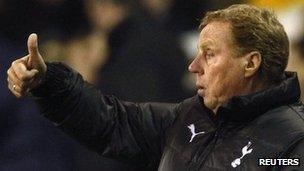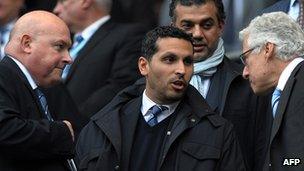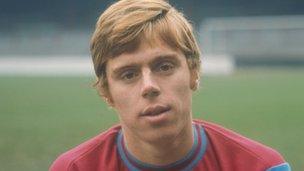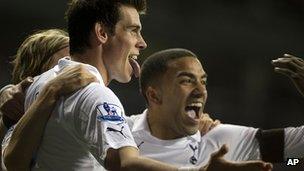Redknapp: An Englishman should manage England
- Published
- comments

Can football managers learn from successful business leaders and vice versa?
I have been examining the commercialisation and globalisation of top flight football, for a new two-part series on Radio 4 called "Among the Managers", which I've made with David Stenhouse of BBC Scotland (the first part is broadcast at 1100 on Wednesday, 4 January).
Among the footballing and business stars I interviewed, two stood out for me as particularly gripping: one with "Big" Sam Allardyce, manager of West Ham (which I will return to on another occasion); the other with Harry Redknapp, manager of Tottenham Hotspur.
As a third-generation Arsenal supporter, it worried me that I thoroughly enjoyed chatting to Mr Redknapp - although there was small consolation in his confession that he grew up a Gooner (he told me the most exciting match he ever saw at Highbury was Arsenal versus Manchester United on the weekend before the 1958 Munich Air Crash).
It was Mr Redknapp's reminiscences of how football used to be that resonated most. But he also said a couple of newsy things, so I had better get those out of the way.
The BBC's Robert Peston talks to Harry Redknapp
And the next England manager is...
There has, for example, been a good deal of speculation that he may be offered the England manager's job, when Fabio Capello steps down next summer. So I asked Mr Redknapp whether he wanted to be England manager.
Here is what he said: "It's a difficult one. You know I've said so many times it's the pinnacle for any Englishman to want to manage their country... I would like to see an English manager manage England. I would like to see that... When Fabio Capello finishes, I would like to see them give it to an Englishman."
So not exactly a "no, nay, never". That said, there is something about the rhythm of the England job that he would not find appealing: "I enjoy the day to day, coming in to work with players, going out on the training pitch every day, seeing the players, being involved every day. I don't know if seeing players once every six or seven weeks, it would be different for me and I'd find it very difficult. I'd get very bored I would imagine, you know. I haven't got too many hobbies, except for a round of golf occasionally."
But: "If it came along it would - it would - it would be difficult to turn it down I think for any Englishman."
So if I were a Spurs supporter (absurd idea) I would be a bit anxious that the club's outstanding manager of recent years could be serving out his final season.

English Premier League clubs have benefited from cash injections of foreign owners
Globalised football
Also, since he's right at the centre of Premier League action, his views on the future of football are worth noting - and what he says is that globalisation for the biggest clubs is work in progress: "We're getting more and more foreign owners into the country now.
"I don't know where it's all going to be in 20 years time... I can see us playing Premier League games all round the world on a regular basis. If you're from China or you're from India or Russia and you own a club, you're going to want to take your club back to where you come from... I think it'll almost be a world Premier League".
Football, but not as we knew it
But it was when Mr Redknapp talked about his playing days at West Ham in the 1960s, and also his early managerial career at Bournemouth that I became particularly enthralled, because it showed quite how much the game has changed within the span of one man's career: "When I first came into it, as a manager at Bournemouth, you know you were responsible for almost everything.
"You had a secretary and you had the manager. And the manager would do the transfers, you would do the contracts with the players, you would negotiate the contracts with the players, you negotiate all the transfer fees with the different managers at different clubs... Whereas nowadays we've all got chief executives, you've got chairmen who are all hands on and really the business side of the club is completely run by them.
"I mean from my point of view, I run the football side of it. I go out today and I take the training, with the coaching staff, we work with the players, I pick the team. I decide who we buy and who we sell. But when it comes to actually doing the negotiating, the chairman, and the chief executive, or specially the chairman at this club, Daniel Levy, he'd be responsible for doing that.
"He would discuss the terms with the selling club or whatever... and he would do all the deals with them. I wouldn't be involved in it. I couldn't even tell you the wages of a player at this club. You know the wages are something that he negotiates.
"You probably have as much idea of what they earn as what I do. I don't even bother to ask him, to be honest with you. It's all done now chairman to chairman or chief executive to chief executive."

Harry Redknapp at West Ham in 1967: "We were all brought up living amongst the supporters."
Motivating the team
So what happens if a player feels he isn't paid enough? Who deals with that?
"They go directly to the chairman. They've all got agents. Agents go to the chairman; the agent would ring the chairman... The player wouldn't do it, he wouldn't speak to the chairman... If I found out players were going directly to the chairman I wouldn't stand for that. Because if they've got any kind of problem, they should come to see me, as far as I'm concerned... They would go through their agent when it comes to a new contract; their agent would deal with the chairman and between them they would sort out the problems and whatever needs to be done."
So with players earning so much and managers not controlling the purse strings, there has been a change in the way that someone like Mr Redknapp motivates his team. The contrast with how he was motivated to do well by Ron Greenwood, when he played alongside the Hammers' greats, Bobby Moore, Geoff Hurst and Martin Peters, could hardly be greater: "You are dealing with more fragile characters now because they're all super highly paid young guys.
"You haven't got the control that you [as a manager] might have had a few years ago. The main control you have is that you pick or don't pick 'em. But in terms of the money they earn now, it's gone beyond all belief. And it keeps getting more and more difficult.
"You don't have that control that my manager would've had when I was a young player, when at the end of the year, you'd sign a new one-year contract. Whether it was Bobby Moore, whether it was Geoff Hurst, Martin Peters - who played in the World Cup final - they'd go in to see the manager. You didn't have an agent. You'd sit in the manager's office and he'd give you maybe a five or 10 pound a week rise.
"And you went home and you thought 'fantastic'. You'd go home and tell the wife 'I got another £10 a week, which is great'. You know we could certainly improve our standard of living and things were moving in the right direction for everybody.
"Nowadays it's different. The [player's] agent goes to the chairman and they go home and say well I got you another £20,000 a week... You haven't got the power that the manager had you know over me or over the rest of the players when we were younger."
'I don't drink with them'
Here is where Mr Redknapp summarised a social and economic revolution in football: "You know they move in different circles. We'd maybe go and have a lager after the game. They'd probably go and have a bottle of £200 champagne or something. I don't know, I'm not sure, I don't drink with them. But it's very, very different, the way they live now.
"We were all brought up living amongst the supporters, if you like. You know Kevin Bond who works with me, his dad John played twenty-odd years at West Ham. He lived 50 yards away from West Ham football ground, in a little terraced house, so the game would finish, he'd walk across the road and he was home. And we all lived in terraced, or semi-detached houses you know...
"Now they all live in beautiful houses. They don't live near the football ground any more, and they probably have very little contact with the average punter now."
Don't shout, don't scream
So how do you get the most out of young men who have everything?
"You know I think players will respond more by you telling them how good they are, rather than telling them what they can't do. I find it's no good shouting and screaming at players and telling them 'you're rubbish and you can't do this', because that doesn't help anybody... Before a game, I go up and have a quiet word with Luka Modric and say: 'Hey Luka, they've got no-one who can live with you today... You can run this game for us... You can destroy this team, you're a different class to anybody they've got'.
"Players, I think they respond to that. Whether it's Gareth Bale, I say 'this right back, he'll be scared stiff of you today Gareth, you know. He can't live with you, he's going to have to foul you because he can't stop you. You know keep running him, just run him to death'. And I think players respond to that, much rather than coming in at half time and shouting and screaming at players, that used to happen.
"Lots of managers would come in and shout, and holler and throw cups of tea at players and God knows what, and threaten them. And that's gone now."
'Leagues within leagues'
So is it all now about the money? Is it impossible for a team that isn't owned by a billionaire or which doesn't have a global fan base to win at the highest level?
"I'm in a fortunate position. I'm in one of the top six teams, where we can buy good players. Okay, we can't compete with Man City, Chelsea, in terms of wages or transfer fees, you know. Man United again will be a step up from us.
"Even Liverpool, you know wage-wise, we wouldn't be anywhere near Liverpool, our top player wouldn't get anywhere near the top player at Liverpool... Our top player would probably be round half what the top players at Liverpool, top player at Liverpool could earn.
"But then again you have to look where we are and then you look down the league, and then you look at some of the other clubs lower down, and look at their resources, what they have to spend. We're on a different level to them.

Redknapp: "They're young lads who want to play."
"So there are leagues within leagues almost in the Premier now. It don't matter how great the coach is, you know. Roberto Martinez is fantastic at Wigan but he can't win the league, it's impossible... because he hasn't got the players, and he can't afford to buy the players. As great a coach as he might be, he can work every afternoon, every night, every morning, coaching the players, working with them, but you can only get out of the players what you can get. Otherwise there's no reason why a Rochdale shouldn't win if it was about coaching or motivation... It can't happen.
"The teams with the best resources are the teams that win the league. Every year you haven't got to be a genius to say well, Man United, Chelsea, Man City this year will win the League. Arsenal, Liverpool, Tottenham could pull off a shock. But they're the six teams that will be up there scrapping away for the top four spots. If anybody else breaks into that it would be a big surprise."
But here is what stops Mr Redknapp, and I suppose many of the rest of us, becoming bitter about the apparent triumph of money in the game. He doesn't think his players have been corrupted in the most fundamental sense: "The thing is they love to play football, that's why they started out. They're young lads who want to play. So when we go out there this morning, if you come and watch us train, you would see players playing absolutely as though their lives depended on it this morning. They train, they work. If you finish up with a little game at the end of eight or nine a side, they'll play and want to win like they do when they're playing Arsenal on a Saturday."
Among the Managers, BBC Radio 4, part one at 1100 on Wednesday, 4 January.